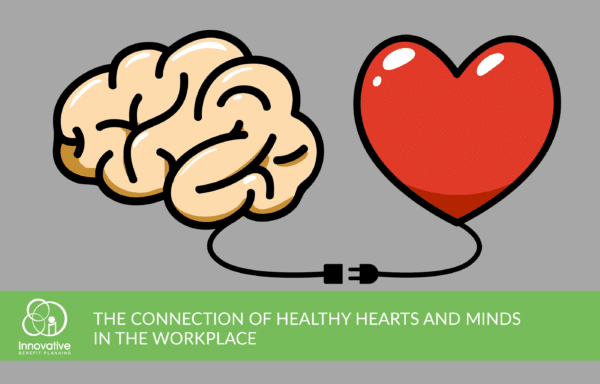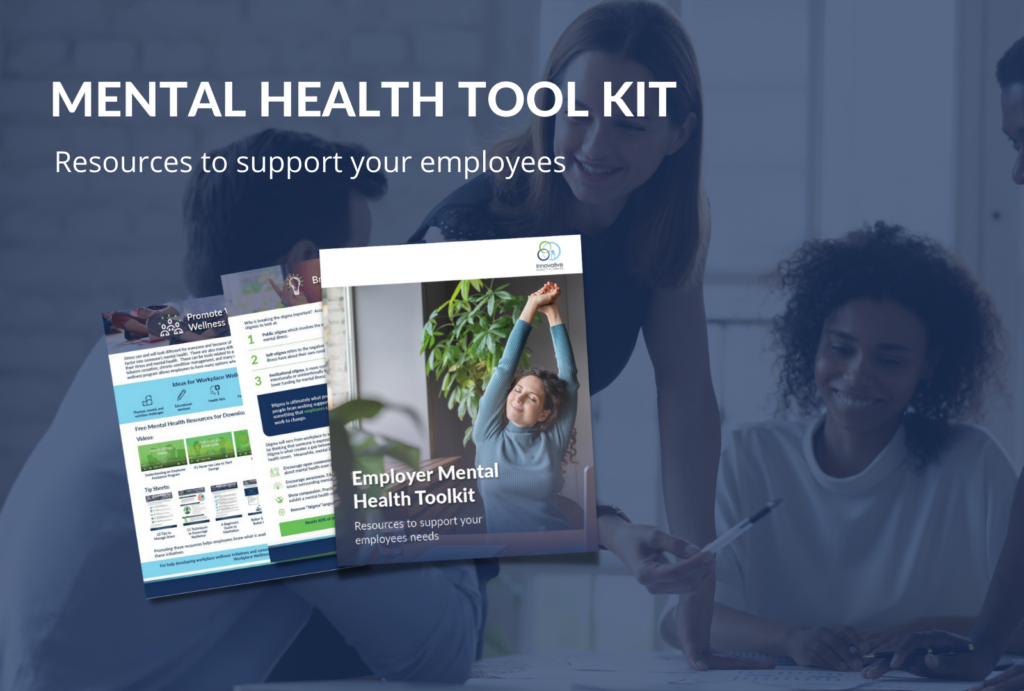The Connection of Healthy Hearts and Minds in the Workplace

American Heart Month, observed every February since 1963, raises awareness about the dangers of heart disease and promotes lifestyle changes that can help people improve their heart health. Despite this, heart disease remains the leading cause of death among Americans. However, the American Heart Association (AHA) is now expanding the scope of its guidance to emphasize the emerging connection between heart health and mental health.
For many years, the AHA stated recently, doctors thought the only link between mental health and heart health stemmed from behaviors (such as a depressed person smoking, drinking, or eating poor) that hampered heart health. However, newer research indicates that physiological, biological, and chemical factors that affect mental health may also influence heart disease. Mental health issues such as work-related stress and anxiety are becoming widely recognized as additional risk factors for heart disease beyond the traditional sources.
In March 2021, the AHA officially recognized the mental health-heart health connection. It recommended that the medical community should address mental well-being as part of its treatment and prevention of cardiovascular disorders. Poor mental health affects cholesterol, blood sugar, and inflammation levels, which can contribute to heart disease and diabetes. According to the Centers for Disease Control (CDC), the mental health disorders most commonly associated with heart disease or increased risk were:
- Mood disorders, such as major depression, temporary depression, and bipolar disorder. For example, depression has been linked with increased hypertension and heart attacks.
- Anxiety disorders, including generalized anxiety, social anxiety, panic disorders, and phobias. Anxiety adversely affects blood vessels and their delivery of oxygen to the body’s cells, increasing incidents of heart failure.
- Chronic stress. Persistent emotional and physical stress over an extended period of time creates biochemical, physiological, and behavioral changes. Stress increases hormones such as adrenaline and cortisol, impacting blood pressure and heart rates.
- Post-Traumatic Stress Disorder. People may experience PTSD after a traumatic experience, such as natural disaster or war.
While there is growing awareness of how psychological health can negatively affect cardiovascular health, research also shows that good mental health can help reduce heart disease and enhance heart well-being. People who feel better (physically and mentally) simply engage in healthier habits. They exercise, eat well, get plenty of rest, and do not smoke.
As American Heart Month encourages health physical activity this year, it also makes the case for better mental health and wellness practices.
How Employers Can Support Heart Health
A healthy heart and a healthy mindset are key ingredients in achieving employee wellness. Employers can help their workers maintain good heart and mental health through robust wellness and education programs. Here are several steps to support heart wellness in the workplace.
- Provide “Heart Healthy” education. Use health fairs, webinars, and educational seminars to help spread the message about good heart practices. AHA, CDC, and other organizations can provide a variety of tools, including brochures, tip sheets, and posters.
- Encourage employees to get preventive exams/annual visits with their primary care provider. Routine screenings for blood pressure, cholesterol, and blood sugar identify common indicators for possible heart disease. Incentives such as gift cards, PTO time, fitness gear, lower medical insurance premiums, and contributions to health savings plans boost employee participation in wellness exams.
- Educate employees about knowing their numbers. Provide annual biometric screenings that provide data so your employees understand their own personal risks for heart disease. Employees can greatly reduce the risk of heart disease by regularly monitoring that their blood pressure, cholesterol, triglycerides, and body mass index levels are within healthy ranges.
- Mental health initiatives. As discussed above, mental health and stress directly affect heart disease. Measures that can reduce both heart disease and mental health risks include stress reduction, Employee Assistance Programs, yoga, mindfulness programs, meditation apps, relaxation spaces, self-care tips, and making sure everyone takes time away from the office.
- Provide heart healthy snacks at the office. Nuts, seeds, veggies and hummus, nut butter, low-fat popcorn, berries, Greek yogurt, protein balls, purified water, salads and other alternatives to traditional vending-machine fare encourage employees to make better choices. Lunchrooms and catered meals should offer salads, soups, and nutritious choices.
- Promote good sleep.
- Encourage exercise inside and outside of work. Examples include sponsoring 5k walks and creating company teams for fitness runs. Offer gym memberships, on-site exercise classes, and lunchtime walking programs.
- Take the stairs. Post healthy living reminders at elevators and escalators that encourage employees to use the stairs.
- Offer standing desks.
- Provide smoking cessation programs. Educate employees on Nicotine Replacement Therapy programs within your health plan and about how smoking adversely affects the heart.
- Promote weight management. Like smoking, being overweight increases the risk of heart disease. Point out the healthy heart benefits of your current programs that encourage weight management.
- Publish a workplace wellness newsletter. Provide healthy living tips, reminders of upcoming events, recipes, and recognition for healthy achievements on a regular basis to keep health front of mind.
- Provide flextime options. Allowing employees to take regular breaks during the day or set their own work hours to let them better manage their work/life balance and reduce personal stress.
- Offer and promote proactive health coaching for employees.
While American Heart Month provides ideal opportunities to remind employees of preventative steps such as these, keep those efforts going beyond February. Promote your company’s wellness initiatives throughout the year, incorporating healthy heart practices into continuing awareness and educational campaigns designed to create a healthy workplace.

12 Page Guide to Assist Employers in Addressing Mental Health in the Workplace
It’s no secret that work-related factors, especially during the pandemic, are impacting employee’s mental health. Download our tool kit for ideas and solutions to support and promote mental health in the workplace including an action plan to train front line managers.
Categories
Archive







